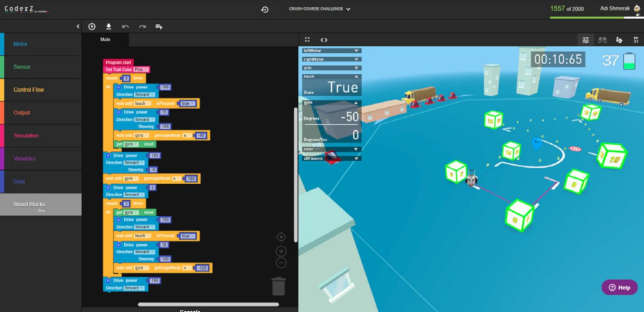Robotics Curriculum Gets Sequel
- By Dian Schaffhauser
- 02/04/20

An education technology company that produces a virtual robotics platform to help middle schoolers learn coding and robotics basics has released a sequel to its original set of curricula. CoderZ's new Cyber Robotics 102 includes between 15 and 20 hours of lesson.
The first course, Cyber Robotics 101, focuses on basic robotics operation, such as how to do turns, detect colors and repeat loops. The second course covers more nuanced activities, such as how to how to handle "dangerous curves," "drive accurate distances" and use a touch sensor while performing repetitive operations. Students move through some 70 "missions" to learn principles of engineering, mechanics, physics, navigation, control and sensors. In the coding realm, they practice programming structures, including commands, variables, conditional logic, loops and functions. Both courses use "Ruby," a virtual robot that exists only online.
Both products include teacher guides, solution sets and presentations and access to an online knowledge base. The curriculum is also designed to be used as a self-paced course.
"Our unique virtual environment's authentic replication of the laws of physics helps students understand concepts such as power, the forces that work on Ruby the robot and how those forces influence Ruby's movement," said Ido Yerushalmi, CEO of the company, in a statement. "The curriculum's gamified missions are designed to deeply engage students so that they not only acquire a deep understanding of these concepts, but they also successfully learn how to use code to program Ruby's actions in a dynamic environment."
According to the company, students can use the skills they pick up through the Cyber Robotics courses in the Cyber Robotics Coding Competition, which doesn't require physical robots. The last one draw 45,000 student competitors in 490 schools across the country. The Spring 2020 schedule has already been announced.
About the Author
Dian Schaffhauser is a former senior contributing editor for 1105 Media's education publications THE Journal, Campus Technology and Spaces4Learning.